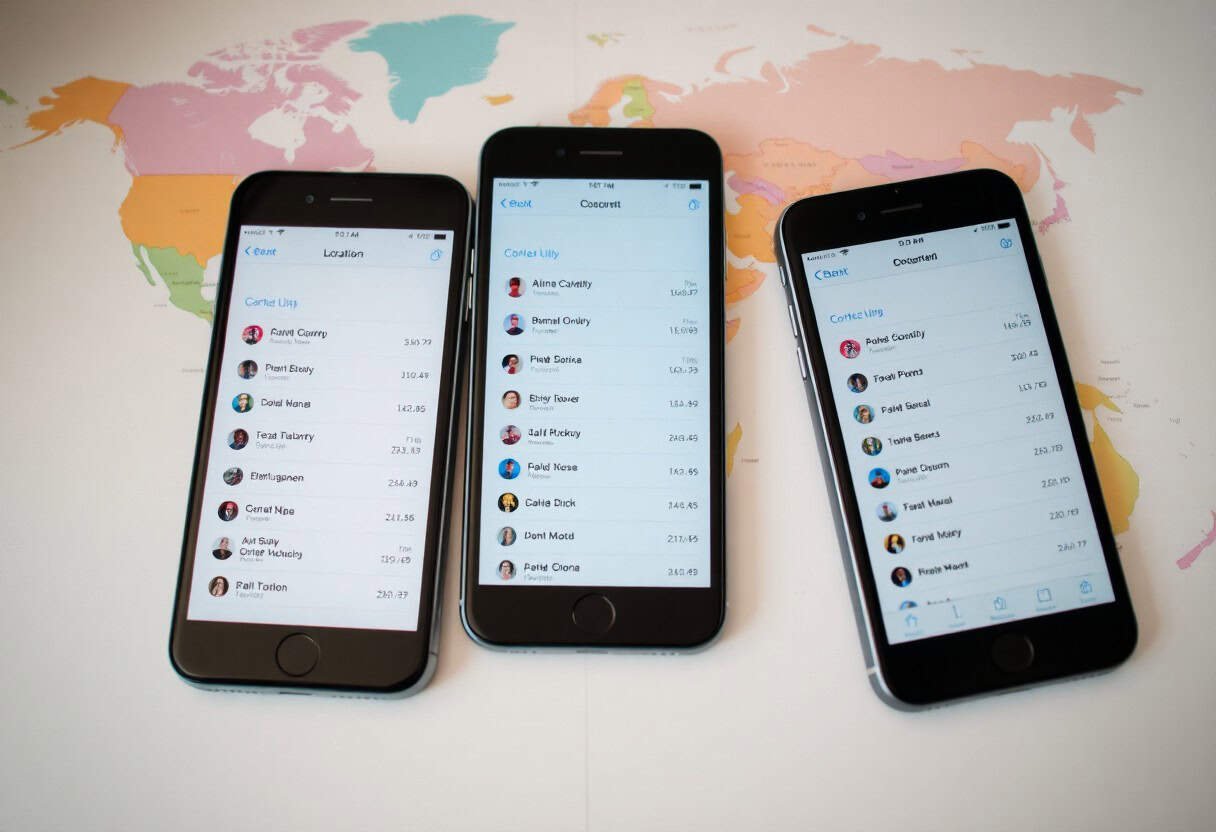There’s a growing debate about whether you should maintain a unique phone number for each location your business operates in. By evaluating the advantages and challenges of having separate numbers, you can enhance customer experience and streamline communication. This decision can significantly influence customer perceptions and operational efficiency, allowing you to tailor your interactions based on location-specific needs. Understanding these dynamics will help you determine the best approach for managing your business communications across different areas.
Key Takeaways:
- Unique phone numbers for each location can enhance customer trust and engagement.
- They allow for better tracking of calls and marketing effectiveness per location.
- Separate numbers can simplify customer service management and improve local relevance.

Distinct Advantages of Multiple Phone Numbers
Utilizing multiple phone numbers tailored to each location offers distinct benefits that enhance your business’s operational efficiency. Each number allows you to target specific customer segments, streamline communication, and provide localized service, ultimately propelling engagement and satisfaction. Additionally, this approach enhances your brand’s presence in each area, fostering a sense of familiarity that can lead to increased customer loyalty and retention.
Enhanced Customer Experience and Trust
With unique phone numbers for each location, customers perceive your business as more accessible and relevant to their community. This localized approach builds trust, as customers often feel more comfortable reaching out to a number they recognize as belonging to their area. Establishing a personal connection through geography can enhance customer satisfaction and foster loyalty, making it easier for you to nurture long-term relationships.
Improved Call Management and Tracking
Multiple phone numbers facilitate better call management by allowing you to segregate inquiries based on location. This separation gives you precise data on call volume, response times, and customer engagement specific to each area. You can analyze patterns in call traffic, allowing you to allocate resources more effectively and respond to local demands swiftly, ensuring operational efficiency.
Implementing improved call management requires utilizing analytics tools that connect to your unique phone numbers, enabling you to gather insights about peak calling times, common inquiries, and caller demographics. With this data, you can tailor your customer service approach for each region, ensuring that your team is adequately prepared for the types of calls they receive. For example, if a specific location receives a high volume of inquiries about certain services, you can train your staff to respond effectively, improving overall customer satisfaction and enhancing operational performance.
Assessing the Costs of Multiple Numbers
Maintaining multiple phone numbers for different locations involves various costs that can impact your overall business budget. Each number typically comes with monthly fees, and if you opt for unique features, such as voicemail or call forwarding, these may incur additional charges. It’s vital to evaluate the return on investment these numbers provide versus the expenses involved, as the initial allure of enhanced customer service can quickly turn into an unnecessary expenditure if not properly managed.
Financial Implications for Businesses
The financial implications of having multiple phone numbers can significantly affect your bottom line. Monthly setup fees, call management features, and potential integration with existing systems add up. For example, using a dedicated local line for each location could range from $10 to $50 per month, depending on service providers. When scaled across numerous locations, these costs can quickly exceed your budget, necessitating careful financial planning.
Potential Complexity in Management
Managing multiple phone numbers introduces complexity that can lead to operational inefficiencies. You may face challenges in tracking calls, ensuring timely responses, and maintaining a consistent customer experience across locations. Additionally, staff training on handling various numbers and systems can strain resources, and these complexities can divert focus from core business operations.
This complexity can manifest in various ways. For instance, employees may not be familiar with the specific procedures for each phone number, resulting in delays and miscommunication. You might find yourself juggling various communication platforms, leading to increased missed calls or unreturned messages. Furthermore, tracking analytics for each phone line becomes crucial, as discrepancies could skew your understanding of customer engagement. Such intricacies demand robust management strategies that could take valuable time away from growing your business.
The Role of Technology in Streamlining Communication
Technology simplifies communication by providing tools that enhance connectivity and operational efficiency. With advancements in communication solutions, businesses can manage calls seamlessly across different locations. Features like call forwarding, voicemail-to-email, and automated attendants allow you to maintain a professional image while ensuring that customer interactions are smooth and responsive, regardless of where your team is based.
VoIP Solutions and Their Benefits
VoIP (Voice over Internet Protocol) solutions enable you to make calls over the internet rather than traditional phone lines, significantly reducing costs. These systems often include features like conference calling and video chat, which enhance collaboration among your teams across various locations. Additionally, VoIP is flexible; you can adjust your phone system as your business grows, making it an ideal choice for scalability.
Virtual Phone Numbers: A Versatile Alternative
Virtual phone numbers provide a flexible solution for managing calls without the need for physical lines. They can be linked to your existing devices, allowing you to maintain a professional presence at each location while providing consistent communication experiences. You can set them up to route to your current phones, ensuring you never miss a call, regardless of where you are located.
Using virtual phone numbers offers several advantages beyond basic call forwarding. They can enhance your business’s local presence, making customers feel more connected and increasing trust. This is particularly beneficial if you’re targeting specific regional markets. For instance, acquiring a virtual number in a particular area may boost your business’s accessibility and appeal, leading to increased customer engagement. Furthermore, they often come with advanced features, such as call analytics and integration with CRM systems, enhancing your overall communication strategy and allowing for more informed decision-making. This level of flexibility and functionality makes virtual phone numbers an attractive option for businesses aiming to streamline their communication practices effectively.
Location-Based Marketing Advantages
Employing unique phone numbers for each location enhances your location-based marketing strategy, enabling targeted engagement with local customers. This approach allows for tracking the effectiveness of regional campaigns, helping you understand customer preferences and behaviors in various markets. By analyzing call data, you can refine your marketing tactics, ensuring they resonate with specific demographics and comply with local regulations while maximizing return on investment.
Tailoring Services to Local Expectations
Adapting your services to meet local expectations becomes manageable with distinct phone numbers for each area. By being more attuned to regional needs, your business can customize offerings, promotions, and customer interactions. This localized approach not only increases customer satisfaction but also fosters brand loyalty, as clients appreciate businesses that invest in their community.
Building Community Connections Through Local Presence
A strong local presence can significantly enhance your business’s engagement with the community. By using location-specific phone numbers, you signal to customers that you are invested in their area. This connection fosters trust and encourages customers to choose your services over national competitors, as they prefer to support businesses that prioritize their local environment.
Establishing a local presence goes beyond just a phone number; it creates an opportunity for your brand to engage with community events, collaborate with local organizations, and contribute to social causes. For instance, sponsoring local sports teams or participating in neighborhood festivals can strengthen your connection with residents, making your brand synonymous with the local culture. This strategy not only attracts customers but also builds a network of advocates who are likely to refer your services, enhancing your reputation and credibility within the community.

Common Misconceptions About Unique Phone Numbers
Many individuals assume that having unique phone numbers for each location guarantees better customer engagement or satisfaction. This notion often leads to unnecessary complexity and confusion, detracting from a seamless customer experience. Misunderstandings surrounding the operational benefits can result in financial strain or logistical challenges that outweigh perceived advantages.
Debunking the Myth of Increased Customer Reach
While unique phone numbers might seem to enhance your reach, the reality is different. Customers often prefer a single point of contact. Fractured communication channels can obstruct service quality and frustrate clients who expect straightforward accessibility. Instead of increasing reach, multiple numbers may dilute your brand’s identity and complicate customer interactions.
Navigating Privacy and Security Concerns
Using distinct phone numbers for various locations can significantly enhance your privacy and security. By segregating personal and business communications, you minimize risks associated with data exposure. However, managing multiple lines also requires vigilance, as each number must be adequately protected to prevent breaches or misuse.
Maintaining unique phone numbers can enhance your ability to safeguard sensitive information related to each location. For instance, employing different numbers allows you to monitor and control incoming calls effectively, identifying potential spam or security threats tailored to specific areas. This targeted approach reduces the risk of personal data leaks associated with a single number, as you can apply unique security measures for each phone line. Implementing robust call screening and data encryption specific to those numbers further reinforces your privacy strategy while providing peace of mind.
To wrap up
Upon reflecting, having a unique phone number for each location can enhance your business efficiency and customer experience. It allows you to better track calls, manage communications, and provide a tailored service at each site. Additionally, it can improve your local SEO and foster a sense of community among your clients. Weigh the benefits against the administrative overhead to determine what best suits your operational needs, ultimately ensuring you stay connected with your clientele effectively.
FAQ
Q: Should I have a unique phone number for each location?
A: Yes, having a unique phone number for each location helps streamline communication and makes it easier for customers to reach the right branch. It also allows for localized marketing efforts and better tracking of customer interactions.
Q: What are the benefits of having separate phone numbers for different locations?
A: Separate phone numbers enable better management of customer inquiries specific to each location. They facilitate the collection of call data for analysis, allow for targeted customer service, and enhance customer experience by reducing confusion.
Q: How can I ensure that my unique phone numbers are effectively used?
A: Promote your unique phone numbers consistently on your website, social media, and marketing materials specific to each location. Train staff to handle calls appropriately based on the caller’s location and utilize call tracking software to assess performance.

